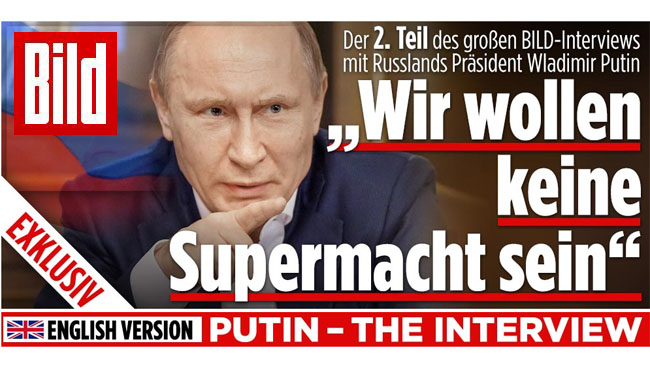On a different logic
Volodymyr OHRYZKO: “German audience, like any other, needs to get the situation explained to it”
German newspaper Bild published an interview with Russian President Vladimir Putin, in which he repeated once again his statements that mislead not only the Germans, but the whole world. In particular, the Russian president said that Crimea had not been occupied by Russian soldiers, and stressed that no lives had been lost during the annexation. However, it is known beyond doubt that one of the Russian takeovers of Ukrainian military units in Crimea resulted in a Ukrainian soldier being killed, and another wounded. The Crimean Tatar leader Mustafa Dzhemilev said in October 2014 that 18 Crimean Tatars had disappeared during the Russian occupation of Crimea. In his interview with German journalists, Putin touched on the topic of Western sanctions which, according to him, are not aimed to help Ukraine, but rather to roll back Russia in geopolitical terms. The Day asked the former Minister of Foreign Affairs of Ukraine, chairman of the Center for the Study of Russia Volodymyr OHRYZKO how one should understand such statements by the Russian president.
“They reflect a completely different logic that does not fit the generally accepted concept of interoperability in international relations, respect for international law and one’s commitments. I would not recommend to look for any logic in the statements made during this interview, because it is just not there, as everything is turned upside down. This should not be surprising. This is a tradition of Russian foreign policy, known for its liking for blatant lies and transforming events into the form in which they are beneficial for Russia.”
However, this interview is aimed primarily at the German audience. How are they affected by this kind of information?
“They must draw conclusions. The German audience, like any other, needs to get the situation explained to it. We must invite reporters, maybe not from Bild, although it is one of the most popular newspapers in Germany and targets the ordinary German. Still, there are other publications being read there, which are no less influential and read by the ones who shape the nation’s foreign policy. Thus, we need to give reasonable, calm, honest interviews to such newspapers, countering all the nonsense that Russia is trying to pass for honest position, although it has never had one.”
Russian President Vladimir Putin touched on the NATO topic in that interview as well. He recalled the words of former NATO Secretary General Manfred Werner, who stated that NATO would have done better by refusing to expand eastward.
“To me, these are quite ridiculous arguments. International law provides for very clear forms of mutual obligations. Such statements, meanwhile, resemble a well-known Chinese whispers game. It should be understood that German politicians of the late 1980s were willing to promise the Soviet Union everything, because the question of the unification of Germany was at stake, and they were willing to take any commitments for all ages to come to make it happen. Thus, this must be treated very simply and calmly. No international legal instrument includes a ban on NATO expansion. What reason can there be, then, to prevent a country that wants to join the club of democratic nations from doing so?”
In addition, Putin stressed that Crimea had not been occupied and no lives had been lost during the annexation. The latter, he said, was not a violation of international law.
“This is an obvious lie, which he denied himself in his subsequent statements. He acknowledged that there were Russian troops in place, that this was in fact the occupation of Crimea, although he denies it again a few theses later. So, looking for any logic in this would be a waste of time and effort. Unfortunately, the current leadership in the Kremlin is not acting according to the norms of international law, but rather according to some myths. For example, he [Putin. – Ed.] mentions Kosovo. Can one compare the Kosovars, a separate nation, with the population of Crimea which is neither nation nor people by definition, but is assigned the right to self-determination by Putin? Any junior student majoring in international law can see that it is distortion of facts and obvious deceit, but he speaks with great confidence, believing himself to be in the right.”
Newspaper output №:
№1, (2016)Section
Topic of the Day





